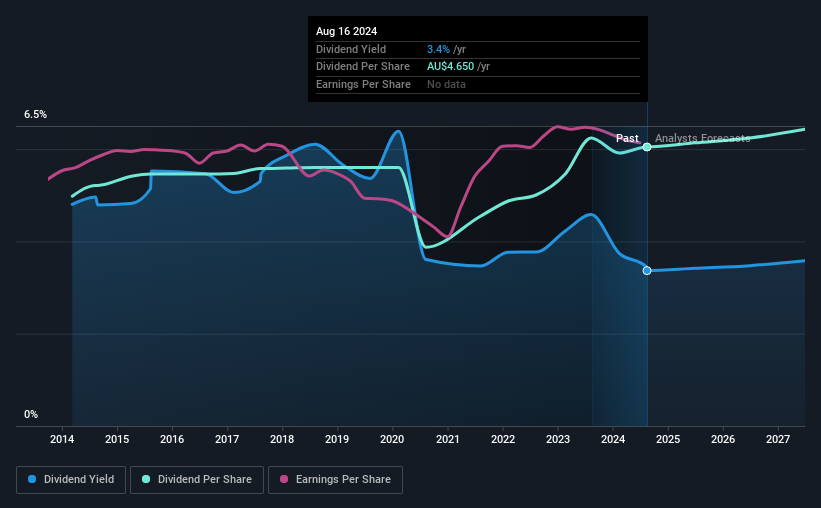Commonwealth Bank of Australia (ASX:CBA) Will Pay A Larger Dividend Than Last Year At A$2.50

Commonwealth Bank of Australia (ASX:CBA) will increase its dividend from last year's comparable payment on the 27th of September to A$2.50. Although the dividend is now higher, the yield is only 3.4%, which is below the industry average.
View our latest analysis for Commonwealth Bank of Australia
Commonwealth Bank of Australia's Payment Expected To Have Solid Earnings Coverage
If it is predictable over a long period, even low dividend yields can be attractive.
Commonwealth Bank of Australia has established itself as a dividend paying company with over 10 years history of distributing earnings to shareholders. Past distributions do not necessarily guarantee future ones, but Commonwealth Bank of Australia's payout ratio of 82% is a good sign as this means that earnings decently cover dividends.
EPS is set to grow by 10.0% over the next 3 years. The future payout ratio over that same time horizon is estimated by analysts to be 79% which is a bit high but can definitely be sustainable.

Dividend Volatility
While the company has been paying a dividend for a long time, it has cut the dividend at least once in the last 10 years. The dividend has gone from an annual total of A$3.83 in 2014 to the most recent total annual payment of A$4.65. This implies that the company grew its distributions at a yearly rate of about 2.0% over that duration. It's encouraging to see some dividend growth, but the dividend has been cut at least once, and the size of the cut would eliminate most of the growth anyway, which makes this less attractive as an income investment.
Commonwealth Bank of Australia May Find It Hard To Grow The Dividend
With a relatively unstable dividend, it's even more important to see if earnings per share is growing. However, Commonwealth Bank of Australia has only grown its earnings per share at 4.5% per annum over the past five years. There are exceptions, but limited earnings growth and a high payout ratio can signal that a company has reached maturity. This isn't the end of the world, but for investors looking for strong dividend growth they may want to look elsewhere.
In Summary
Overall, we always like to see the dividend being raised, but we don't think Commonwealth Bank of Australia will make a great income stock. The payments are bit high to be considered sustainable, and the track record isn't the best. We would probably look elsewhere for an income investment.
It's important to note that companies having a consistent dividend policy will generate greater investor confidence than those having an erratic one. At the same time, there are other factors our readers should be conscious of before pouring capital into a stock. For instance, we've picked out 1 warning sign for Commonwealth Bank of Australia that investors should take into consideration. If you are a dividend investor, you might also want to look at our curated list of high yield dividend stocks.
New: AI Stock Screener & Alerts
Our new AI Stock Screener scans the market every day to uncover opportunities.
• Dividend Powerhouses (3%+ Yield)
• Undervalued Small Caps with Insider Buying
• High growth Tech and AI Companies
Or build your own from over 50 metrics.
Have feedback on this article? Concerned about the content? Get in touch with us directly. Alternatively, email editorial-team (at) simplywallst.com.
This article by Simply Wall St is general in nature. We provide commentary based on historical data and analyst forecasts only using an unbiased methodology and our articles are not intended to be financial advice. It does not constitute a recommendation to buy or sell any stock, and does not take account of your objectives, or your financial situation. We aim to bring you long-term focused analysis driven by fundamental data. Note that our analysis may not factor in the latest price-sensitive company announcements or qualitative material. Simply Wall St has no position in any stocks mentioned.
About ASX:CBA
Commonwealth Bank of Australia
Provides retail and commercial banking services in Australia, New Zealand, and internationally.
Excellent balance sheet average dividend payer.
Similar Companies
Market Insights
Community Narratives



